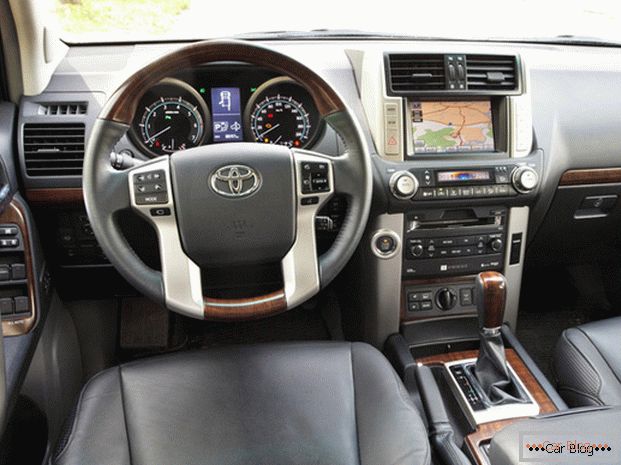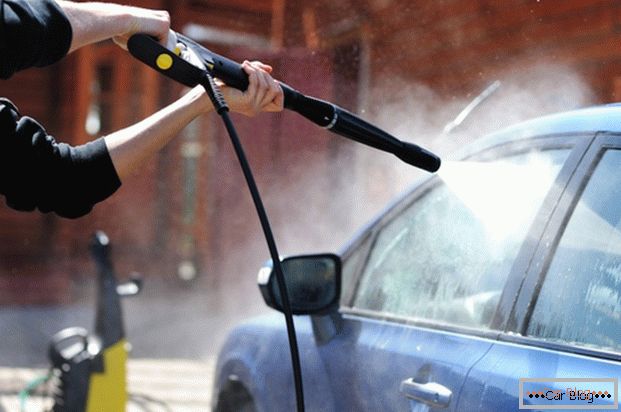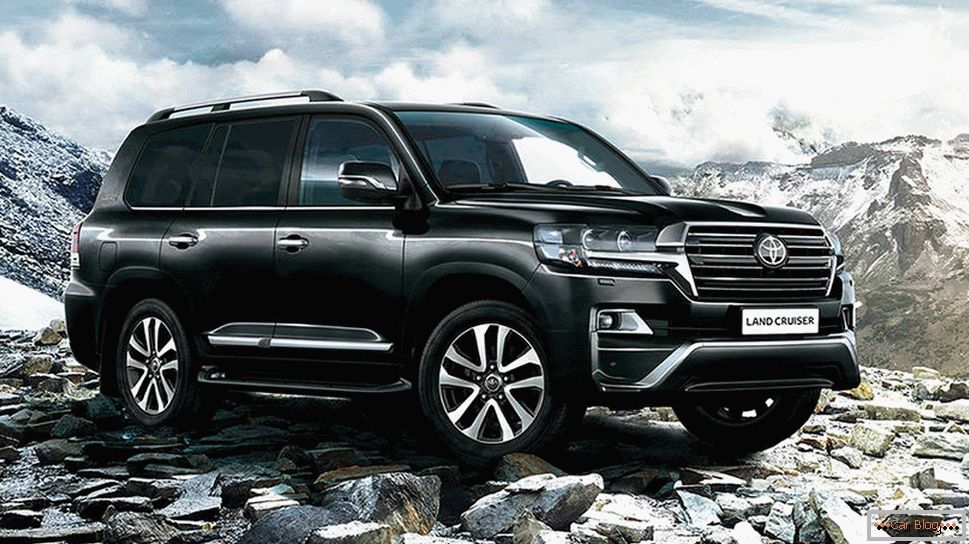How pleasant it is, when the car does not require attention, the engine runs clearly and evenly, the car listens to the steering wheel, and the suspension does not knock and provides comfort. Such a car is convenient and safe. And now, a person warms up his car and moves to his intended destination using his usual route, when suddenly he brakes, he hears a sharp, ear-squeaking creak coming from somewhere in the area of wheels. The car owner immediately tries to figure out in a panic why the brakes on the car squeak.
But is creaking really as dangerous as it is painted? We take courage, and try to find out the reasons for the squeak of car brakes. And, at the same time, to answer, is the creaking of brakes dangerous?
Content
- 1 Why do they creak?
- 2 Squeak Source - Vibration
- 3 Workout
- 4 Problem in the sensor
- 5 Weather
Why do they creak?
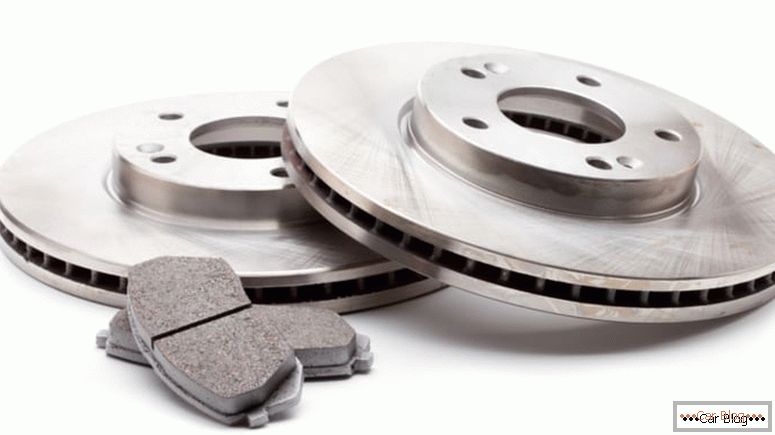
The creaking caused by poor-quality brake shoes occurs only in 30% of cases.
The most common misconception of motorists in the field of knowledge about the braking system - the source of the whistle when braking. And the perpetrators of this are not only unqualified speculations of inexperienced motorists, but also often the “sentence” imposed at service stations: “Brake creak - brake pad wear”. In addition, the pattern after such a "sentence" will be an unequivocal advice to put the pads of the company "N", which are known as the most "non-creaking" pads on the market.
Let me assure you that these pads will creak just as quickly as the “regular” ones. Experts say that unpleasant sounds from the brake system are caused by pads (or rather, their quality) only in 30 percent of cases. So what is the reason for the squeak in the remaining 70 percent?
Squeak Source - Vibration
In fact, during braking, all elements of the “creaky” brake system vibrate, but due to the fact that the pad is mobile and does not have a rigid connection with the car, there is nothing to dampen its vibrations. As a result, we hear the vibration from the pad.
See also: How does the ABS on the carIn this situation, an experienced “serviceman” will check whether one of the following conditions is the cause of auto-oscillations:
- formation of a collar on a worn brake disc. The shoulder touches the edge of the pad and causes it to “oscillate” with a frequency unpleasant for the human ear;
- "Wedging" pads in the guides. Guide rails need special lubrication;
- not adjusted piston stroke in the caliper;
- and, of course, one cannot but doubt the quality of the pad itself, namely the heterogeneity of the composition of the friction lining, the quality of its gluing or sintering.
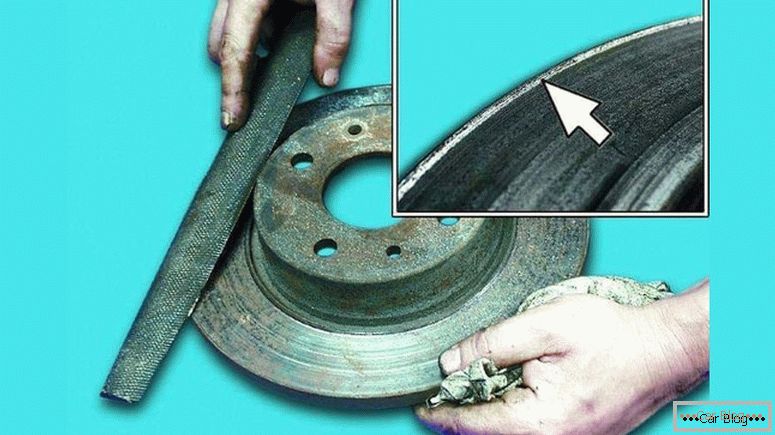
Groove brake disc to get rid of squeak
The shoulder of the disc wear is removed by grooving the working surface. It is important that the thickness of the working part of the disk after the groove meets the standards. If the repair layer of the disk is exhausted after the groove, the entire disk is changed, otherwise the squeak and whistle will remain even with the most “scratch-resistant” pads. After working with the brake disc, pay attention to the pads - lubricate the side faces, the holes of the caliper guides, as well as the back wall with “anti-squeak” lubricant. I hope everyone understands why in no case should not lubricate the working surface of the pads?
Disc and pads are ready. Check the work calipers - guides and pistons. Guide grease with the same grease as the pads. After that, collect the brakes and check for lack of squeak. If all the above "gestures" did not help, then the problem is really in the pads, and they can be replaced. It should be noted that you will achieve the best tandem “disc-pads” only if they are produced by one manufacturer. Compliance with this condition will ensure maximum compatibility of the interacting materials of the disc and pads, and as a result, will reduce the likelihood of unwanted "violin accompaniment" during braking.
Workout
For the complete disappearance of squeaks, when replacing the brake pads, it takes some time. This is due to the "running-in" rubbing surfaces to each other. The trick is that during the manufacture of the pad, a layer containing “parasitic” impurities is formed on the friction pad. There is an easy way to get rid of this unpleasant effect. Accelerate the car on a straight stretch of the track to a speed of 100 km / h and slow down smoothly but evenly. Repeat this operation several (5-6) times. If the “sounds” do not disappear after that, it means that you need to check all the elements of the brake mechanism again.
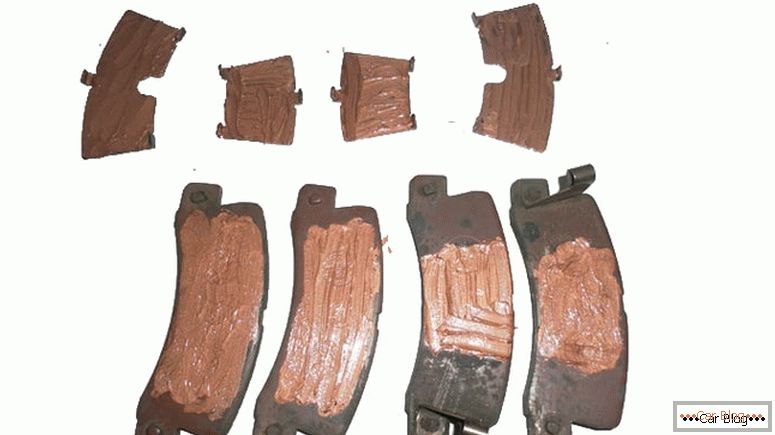
You can try to lubricate the pads with a special paste against squeaking. But do not forget - the paste should not fall on the working surface of the pads.
Problem in the sensor
Not so often, but it still happens that the grinding of the brakes is caused by an incorrectly mounted plate of the pad wear sensor. When you press the brake pedal, the plate just touches the brake disc, emitting a distinct rattle.
See also: How to handle brake discs with your own handsWeather
If squeaks and whistles are not the rule in your car, then it is worth noting under what weather conditions these sounds appear. Perhaps they are accompanied by rain or occur only on a frosty morning? If so, then in your case the answer to the question of why brake pads creak will be their banal wetness.
To eliminate the influence of the weather, you should “dry” the brakes. On the way to the parking place, several times, smoothly, but slow down quickly enough. As a result of the heating, the brake mechanisms will dry out.
Summing up, it is safe to say that the creaking, apart from discomfort, does not entail any serious consequences. In any case, when the squeaks appear, it is necessary to make a diagnosis, because the wear of the brake disc is not excluded. Testing can be done on your own - this is a simple task.

